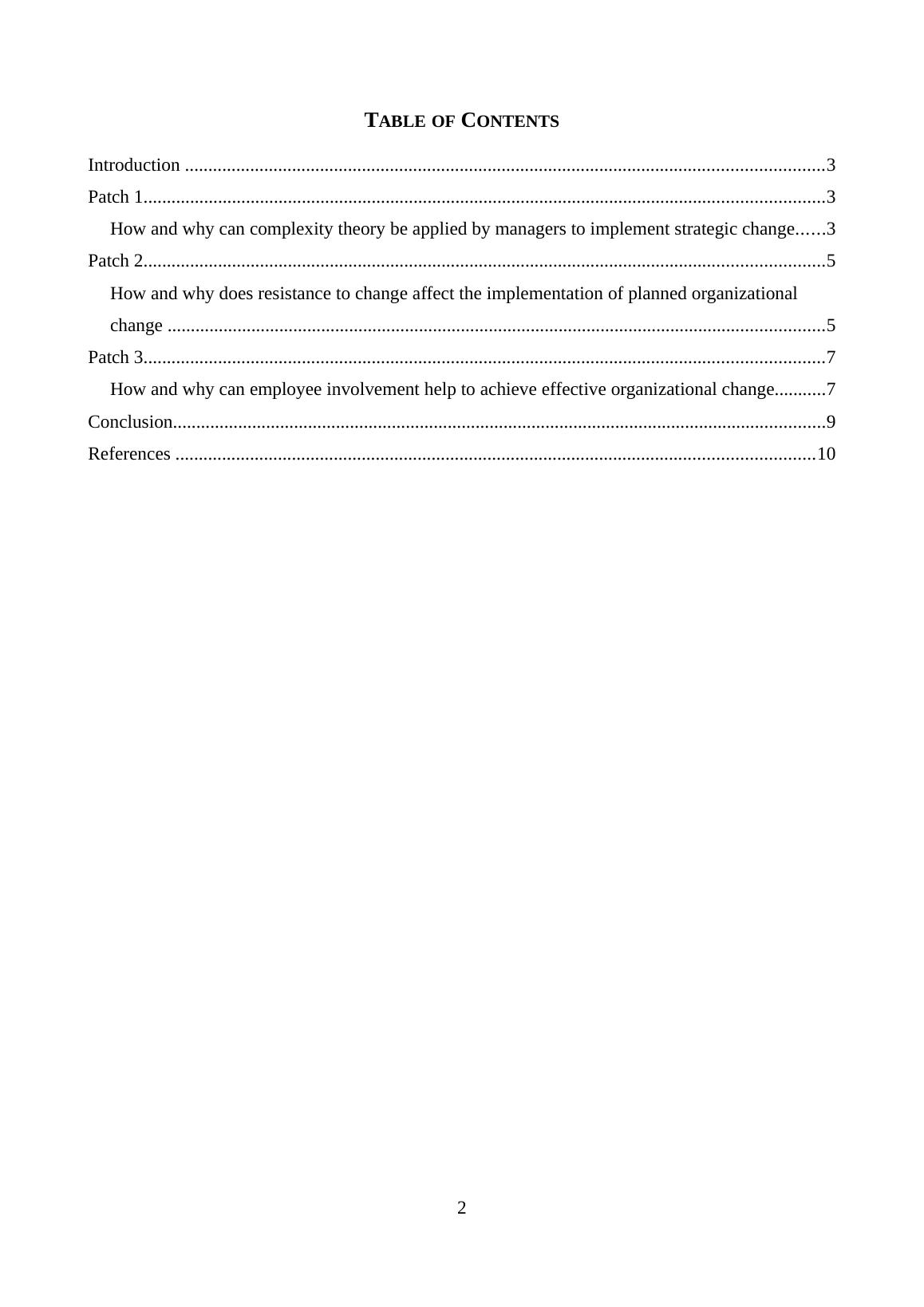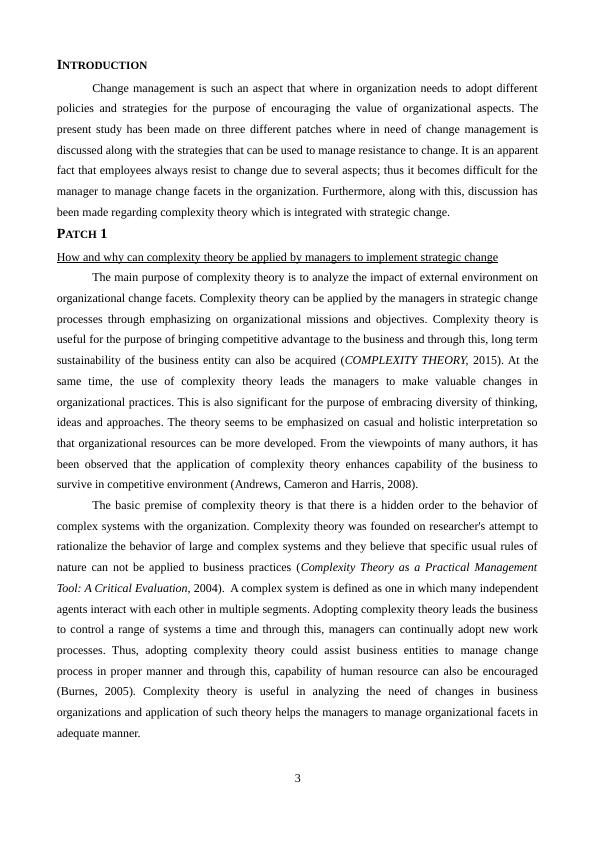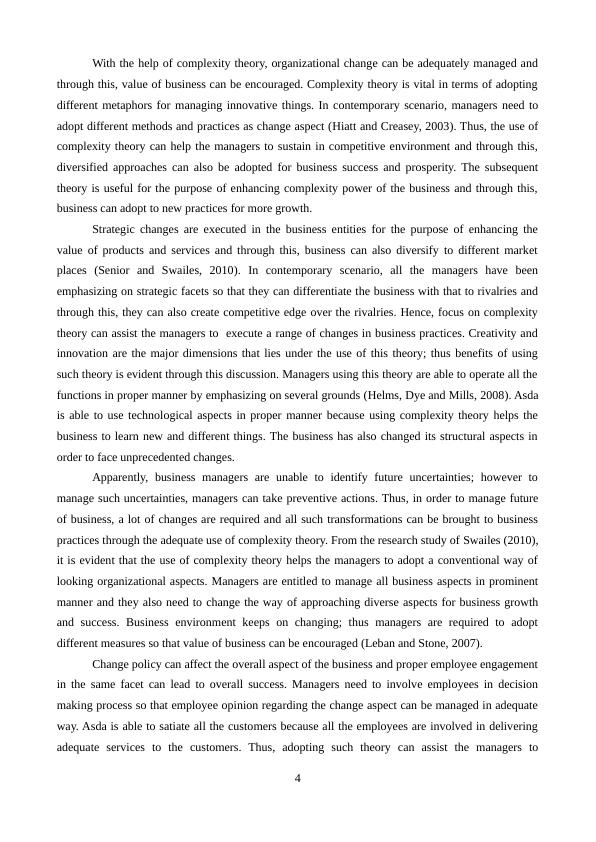Ask a question from expert
Organizational Change Management: PDF
13 Pages5084 Words249 Views
Added on 2019-12-03
Organizational Change Management: PDF
Added on 2019-12-03
BookmarkShareRelated Documents
ORGANIZATIONALCHANGEMANAGEMENT1

TABLEOF CONTENTSIntroduction .........................................................................................................................................3Patch 1..................................................................................................................................................3How and why can complexity theory be applied by managers to implement strategic change......3Patch 2..................................................................................................................................................5How and why does resistance to change affect the implementation of planned organizational change .............................................................................................................................................5Patch 3..................................................................................................................................................7How and why can employee involvement help to achieve effective organizational change...........7Conclusion............................................................................................................................................9References .........................................................................................................................................102

INTRODUCTIONChange management is such an aspect that where in organization needs to adopt differentpolicies and strategies for the purpose of encouraging the value of organizational aspects. Thepresent study has been made on three different patches where in need of change management isdiscussed along with the strategies that can be used to manage resistance to change. It is an apparentfact that employees always resist to change due to several aspects; thus it becomes difficult for themanager to manage change facets in the organization. Furthermore, along with this, discussion hasbeen made regarding complexity theory which is integrated with strategic change. PATCH 1How and why can complexity theory be applied by managers to implement strategic changeThe main purpose of complexity theory is to analyze the impact of external environment onorganizational change facets. Complexity theory can be applied by the managers in strategic changeprocesses through emphasizing on organizational missions and objectives. Complexity theory isuseful for the purpose of bringing competitive advantage to the business and through this, long termsustainability of the business entity can also be acquired (COMPLEXITY THEORY, 2015). At thesame time, the use of complexity theory leads the managers to make valuable changes inorganizational practices. This is also significant for the purpose of embracing diversity of thinking,ideas and approaches. The theory seems to be emphasized on casual and holistic interpretation sothat organizational resources can be more developed. From the viewpoints of many authors, it hasbeen observed that the application of complexity theory enhances capability of the business tosurvive in competitive environment (Andrews, Cameron and Harris, 2008). The basic premise of complexity theory is that there is a hidden order to the behavior ofcomplex systems with the organization. Complexity theory was founded on researcher's attempt torationalize the behavior of large and complex systems and they believe that specific usual rules ofnature can not be applied to business practices (Complexity Theory as a Practical ManagementTool: A Critical Evaluation, 2004). A complex system is defined as one in which many independentagents interact with each other in multiple segments. Adopting complexity theory leads the businessto control a range of systems a time and through this, managers can continually adopt new workprocesses. Thus, adopting complexity theory could assist business entities to manage changeprocess in proper manner and through this, capability of human resource can also be encouraged(Burnes, 2005). Complexity theory is useful in analyzing the need of changes in businessorganizations and application of such theory helps the managers to manage organizational facets inadequate manner. 3

With the help of complexity theory, organizational change can be adequately managed andthrough this, value of business can be encouraged. Complexity theory is vital in terms of adoptingdifferent metaphors for managing innovative things. In contemporary scenario, managers need toadopt different methods and practices as change aspect (Hiatt and Creasey, 2003). Thus, the use ofcomplexity theory can help the managers to sustain in competitive environment and through this,diversified approaches can also be adopted for business success and prosperity. The subsequenttheory is useful for the purpose of enhancing complexity power of the business and through this,business can adopt to new practices for more growth. Strategic changes are executed in the business entities for the purpose of enhancing thevalue of products and services and through this, business can also diversify to different marketplaces (Senior and Swailes, 2010). In contemporary scenario, all the managers have beenemphasizing on strategic facets so that they can differentiate the business with that to rivalries andthrough this, they can also create competitive edge over the rivalries. Hence, focus on complexitytheory can assist the managers to execute a range of changes in business practices. Creativity andinnovation are the major dimensions that lies under the use of this theory; thus benefits of usingsuch theory is evident through this discussion. Managers using this theory are able to operate all thefunctions in proper manner by emphasizing on several grounds (Helms, Dye and Mills, 2008). Asdais able to use technological aspects in proper manner because using complexity theory helps thebusiness to learn new and different things. The business has also changed its structural aspects inorder to face unprecedented changes. Apparently, business managers are unable to identify future uncertainties; however tomanage such uncertainties, managers can take preventive actions. Thus, in order to manage futureof business, a lot of changes are required and all such transformations can be brought to businesspractices through the adequate use of complexity theory. From the research study of Swailes (2010),it is evident that the use of complexity theory helps the managers to adopt a conventional way oflooking organizational aspects. Managers are entitled to manage all business aspects in prominentmanner and they also need to change the way of approaching diverse aspects for business growthand success. Business environment keeps on changing; thus managers are required to adoptdifferent measures so that value of business can be encouraged (Leban and Stone, 2007). Change policy can affect the overall aspect of the business and proper employee engagementin the same facet can lead to overall success. Managers need to involve employees in decisionmaking process so that employee opinion regarding the change aspect can be managed in adequateway. Asda is able to satiate all the customers because all the employees are involved in deliveringadequate services to the customers. Thus, adopting such theory can assist the managers to4

End of preview
Want to access all the pages? Upload your documents or become a member.
Related Documents
Behavioral Science – Change Management Reportlg...
|13
|4033
|210
Organizational Behaviour Management Environment and Leadershiplg...
|12
|4317
|28
Implementing Change Management in Organizational Change Managementlg...
|14
|3999
|67
Organisational Change Management: Implementing Strategic Change and Employee Involvementlg...
|12
|3571
|115
Role of Leadership in Change Management : Reportlg...
|16
|4085
|144
Managing Change in Organizationslg...
|10
|2765
|74